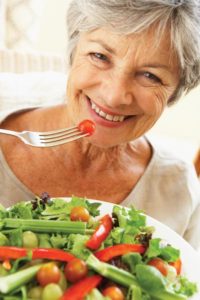
by Jennifer Tipton (RN Jenn)
Eating healthy is something we all struggle with; however, seniors are often faced with extra challenges. Sometimes food just doesn’t taste the same, there may be a loss of appetite, difficulty chewing, or the inability to go food shopping, and there’s also the consideration of certain dietary restrictions.
Here are some tips to help you along:
Choose fruits and vegetables that are brightly colored and perk them up with lemon, herbs or spices.
Make at least half of your grains whole grains. Read the ingredients list, it should say “whole” grain and contain at least 3g of fiber. Fiber can help lower cholesterol, blood sugar and prevent intestinal problems.
Keep meat and poultry portions small and lean and vary your protein choices to include plant based sources like beans and peanut butter.
Drink plenty of fluids as they play an important role in digestion, nutrient absorption and regularity. With age, you may lose your sense of thirst, so don’t wait until you’re thirsty, try sipping throughout the day.
Cut back on foods high in fat and salt. Choose plant based oils and margarines instead of products high in saturated fat. Instead of reaching for the salt shaker, perk things up as in tip #1, too much sodium can raise blood pressure or put you at risk for heart disease, stroke or kidney disease.
If you suffer from a lack of appetite, small frequent meals are a wise choice, rather than to feel overwhelmed staring at a large plate of food. Meals can also be supplemented with nutritional shakes; there are a variety of them, some specific to certain underlying health issues, so check with your physician to see what might be recommended to meet your individual needs.
If chewing is a problem, a visit to your dentist might remedy the situation but until then, eat softer foods that are easier to chew, and if you have been advised of any dietary restrictions, a consultation with a dietician may be of great help.
If you are over 65 and want to stay at the same weight you are now, Dietary Guidelines suggest these calorie levels:
Women
Not physically active – 1,600 calories/day
Moderately active – 1,800 calories/day
Active lifestyle – 2,000 calories/day
Men
Not physically active – 2,000 to 2,200 calories/day
Moderately active – 2,200 to 2,400 calories/day
Active lifestyle – 2,400 to 2,600 calories/day
Brisk walking, golf, or dancing are examples of moderate activity whereas swimming, jogging, or tennis are examples of an active lifestyle.
Only be as physically active as your ability and condition allow.
Area Agency on Aging offers home delivered meals and resources for assistance with shopping (805) 477-7300
